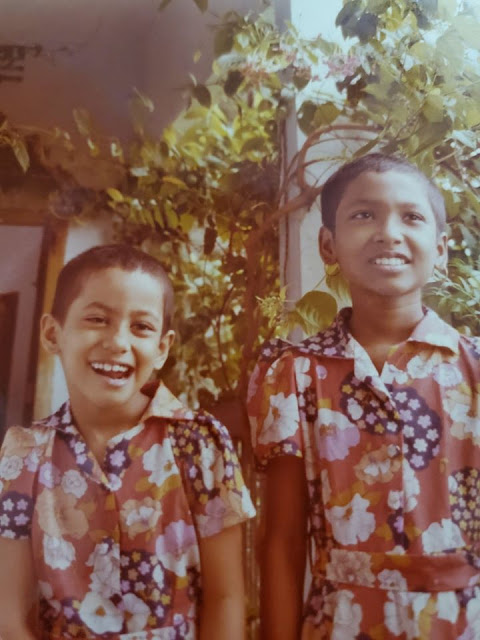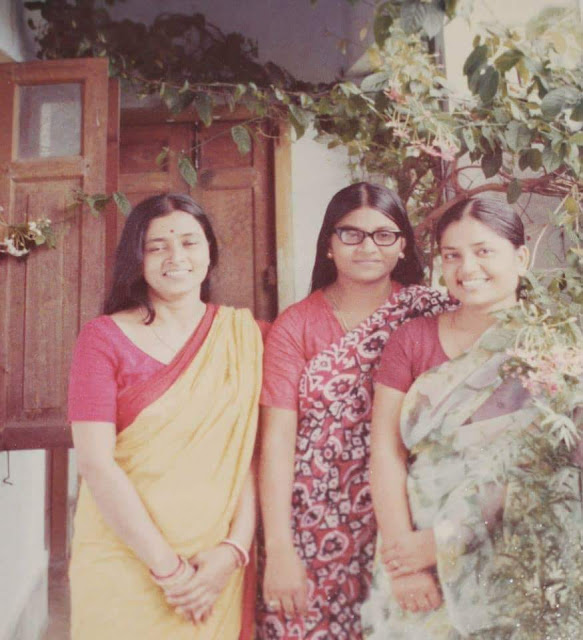Black, brown, white and yellow – the human rainbow
But I am in America now. I could tell Tathoi my new-found wisdom, “The world is your oyster. You can become anything you want to become. You can become anything, anytime you want to become.” Tathoi showed me her plaque; and I drifted into my childhood dreams in dreams. Now looking through the windows, the outside world is making me happy. White snow has an incredible power of sinless beauty. Nobody has stepped outside yet - not even the squirrels and the birds. The pristine world is untouched. I know the footprints of the squirrels. I know the footprints of different birds. I knew the footprints of deer even when we used to live in our house in the country. There is this most wonderful book I own which tells me how to find out the footprints of the animals on snow. It is surreal.
 |
| Google doodle on 1/20/2020 : https://g.co/doodle/bwgsf |
I did not grow up in the USA. But I still remember how I used to cry after watching Alex Haley’s “Roots” on TV while growing up in Bangladesh. Alex Haley wrote the novel “Roots: The Saga of an American Family” in 1976. “It tells the story of Kunta Kinte, an 18th-century African, captured as an adolescent, sold into slavery in Africa, transported to North America; following his life and the lives of his descendants in the United States down to Haley. The release of the novel, combined with its hugely popular television adaptation, “Roots” (1977), led to a cultural sensation in the United States, and it is considered to be one of the most important U.S. works of the 20th century.” I remember how I used to shiver seeing Kunta Kinte tied up in chains. His neck was tied too, like an animal. His white master was slashing and whipping his black body: in those days I used to see Kunta Kinte’s sweat and blood soaked body in all my nightmares. Now thinking back, I think that was one great thing Bangladesh Television did – they showed the “Roots” to another part of the racial world.
“The heart has no tears to give;--it drops only blood, bleeding itself away in silence.”
"Children always have to be whipped," said Miss Ophelia; "I never heard of bringing them up without."
“Whipping and abuse are like laudanum: you have to double the dose as the sensibilities decline.”
After immigrating to the USA, I listened to Billie Holiday’s song, “Strange Fruit”. The first time I heard it, my safe, snow covered castle of Wisconsin collapsed; I could not breathe.
Pastoral scene of the gallant South
Here is a fruit for the crows to pluck
In this game, the immigrant brown people of our country, of our sub-continents, are also not very far behind. They feel proud thinking that they did not buy a house in the black neighborhood.
I have spent the first eighteen years of my life in Bangladesh, the next twelve years in India, and the past twenty two years in the USA. In my fifty-two years of life, I have seen enough so-called educated Bangladeshi and Indian men, but I have never seen a Bangladeshi or Indian man marrying a black woman. I have seen them marrying white girls, I have seen them boasting about their milk-skinned wives, I have even seen their parents and relatives proud of the pale, ‘foreign’ bride – the ‘Memshaheb’.
In Bangladesh and in India, most of the people still refer to the black people as Negros; they do not even know that our civilization is trying very hard to eradicate this very word from the human dictionary.
The immigrant Indian and Bangladeshi people go around telling in their ‘desi’ circles, “Our kids do not have any black friends.”
The truth is that back home, these are the people who used to put advertisements in Bangladeshi and Indian newspapers asking for “fair skinned wives” for their arranged marriages. Their relatives are still doing it; knowingly, unknowingly. Women are a commodity in our country; the fairer, the better, just as they think the light skinned cabbages are better than the purple ones.
Even today, if they see a light skinned, beautiful girl in our country, they will always exclaim, “Oh, how pretty (“shundori”) she is!” But if they see a dark skinned, beautiful girl, they will say, “Well, she is sweet (“mishti”)!” She is never pretty in their eyes, she is never beautiful.
I still remember the day when I went to visit a so-called friend’s house in Kolkata after my marriage. That friend is a leftist, progressive person; at least he claimed that throughout his life. I did not have any reason to believe that from any of his actions though. That day, the friend’s brother-in-law was also present. He had heard that my husband had married a foreigner. He was expecting a white or yellow skinned girl from England, America or at least from Japan. Looking at my plain looking, black, Bangladeshi face, he got the shock of his life! That friend started laughing hysterically; he just stood there, and did not say a single word to his brother-in-law. He himself has told me this story many-a-times after that. He found it very funny, amusing, and entertaining. And I, even after some twenty-six years, still remember how all of them laughed. Well, technically I, a Bangladeshi girl, was a foreigner in Kolkata, India! But that wasn’t good enough for them. I know India was under the British rule for two hundred years. Love and respect for racial supremacy is ingrained in their genes, in their blood. But has not the world progressed after that? We, the Bangladeshi women, are born fighters and warriors. Bangladesh is a country of countless rivers; we know how to swim against the tide.
There is racism in Asia. There is racism in Bangladesh, Bhutan, Brunei, Myanmar, Cambodia, China, Hong Kong, India, Indonesia, Iran, Israel, Japan, Jordan, Malaysia, Russia, Singapore, South Korea, Pakistan, Philippines, Taiwan, Thailand, and Vietnam.
Though the rest of the world cannot differentiate between the Chinese, Japanese, Korean, and Vietnamese kids - they are all yellow in their eyes; an East Asian man knows the shades of yellows.
Likewise, though the people from India and Bangladesh are all brown colored people in the eyes of the American, British, and Australian, people from our part of the world can really see the differences in the many shades of browns. In their eyes, the lighter the better.
By that same measuring tape, my mother and my sister Shyama are always beautiful in our country and I am not. In fact, I grew up listening to this, “Oh Rama? She is black as a jet-black ink pot.” They even told my grandmother that Rama has come from a farm of black nigella seeds. But my sister “Shyama is as beautiful and fair as a Persian rose!” I bet none of them have ever seen a Persian rose (“Basrai golap”) in their lifetime.
In Bangladesh, they used to give certificates from a board office after the high-school exams. I went to the board office with my mom and my sister Shyama. In Bangladesh and in India, people’s colors and looks are everybody’s business. They have to always give their judgement on it, they have to comment. The clerk who was delivering my certificate was happy to see Shyama, as she is fair and beautiful like my mom. But after staring at my face for just a few seconds, he asked my mom “Is she your daughter? Your own daughter? Not adopted? Her skin color is so different from yours!” My mom is a very sharp-witted woman. Immediately she answered to the clerk, “Well, I used to eat lots of barbequed eggplants before her birth- that’s why she is so dark, totally charcoal black!” Needless to say, if I told all of these colorful stories, I would be able to write another ʾAlf layla wa-layla” (“One Thousand and One Nights” – the “Arabian Nights!")
I should not forget to mention that in their eyes, adoption is also looked down upon. It is almost like an unforgivable sin. They pretend to be progressive, moderate and ever forgiving, “Oh, that child is so lucky!” It never crosses their minds that it is actually the other way around, and it is in fact the parents' good luck that they get to raise a child!
Racial discrimination is our civilization’s untold, unpunished crime - it is a disgrace.
My work is done for today. I am going home now. I have switched on the radio in my car. On NPR (the National Public Radio), they are broadcasting Martin Luther King Jr’s famous speech, “I Have a Dream.” I am focused on that historical speech. Pictures from MLK’s life - lives of the black people, have started reeling before my eyes.
I remember how, as a child, Martin Luther King had to attend segregated public schools in Georgia. I remember how there was segregation on buses; the black and white were not allowed to ride the bus as equals. I remember how King was arrested, how his home was bombed, how he was subjected to personal abuse. I remember how “he led a massive protest in Birmingham, Alabama, that caught the attention of the entire world, providing what he called a coalition of conscience, and inspiring his ‘Letter from a Birmingham Jail’, a manifesto of the Negro revolution; he planned the drives in Alabama for the registration of Negroes as voters; he directed the peaceful march on Washington, D.C., of 250,000 people to whom he delivered his address, “l Have a Dream”. (from:
I started whispering along with Martin Luther King Jr.-
“I have a dream that one day on the red hills of Georgia, the sons of former slaves and the sons of former slave owners will be able to sit down together at the table of brotherhood.
I have a dream that one day even the state of Mississippi, a state sweltering with the heat of injustice, sweltering with the heat of oppression, will be transformed into an oasis of freedom and justice.
I have a dream that my four little children will one day live in a nation where they will not be judged by the color of their skin but by the content of their character.
I have a dream today!
I have a dream that one day, down in Alabama, with its vicious racists, with its governor having his lips dripping with the words of "interposition" and "nullification" -- one day right there in Alabama little black boys and black girls will be able to join hands with little white boys and white girls as sisters and brothers.
I have a dream today!”
On April 4, 1968, Martin Luther King Jr. was assassinated. He was standing on the balcony of his motel room in Memphis, Tennessee that evening. He was there to lead a protest march for the striking garbage workers of the city.
Today we are standing here in 2020; Martin Luther king Jr’s dream has not yet become true.
Published in 200 words:
Wisconsin State Journal: Opinion: Letters to the editor: Jan 31, 2020
WSJ link: https://madison.com/wsj/opinion/letters/racism-festers-around-the-world----kalyani-rama/article_1e6964a0-28ec-5e89-af2f-40f6ebedc699.html














Very well written, Rama.Discrimination comes in a variety of forms. There is so much social bullying among the expatriate communities ...
ReplyDeleteThank you so much for sharing your story, educating those of us to your struggles, and keeping the dream of Martin Luther King alive! -Ivory
ReplyDelete